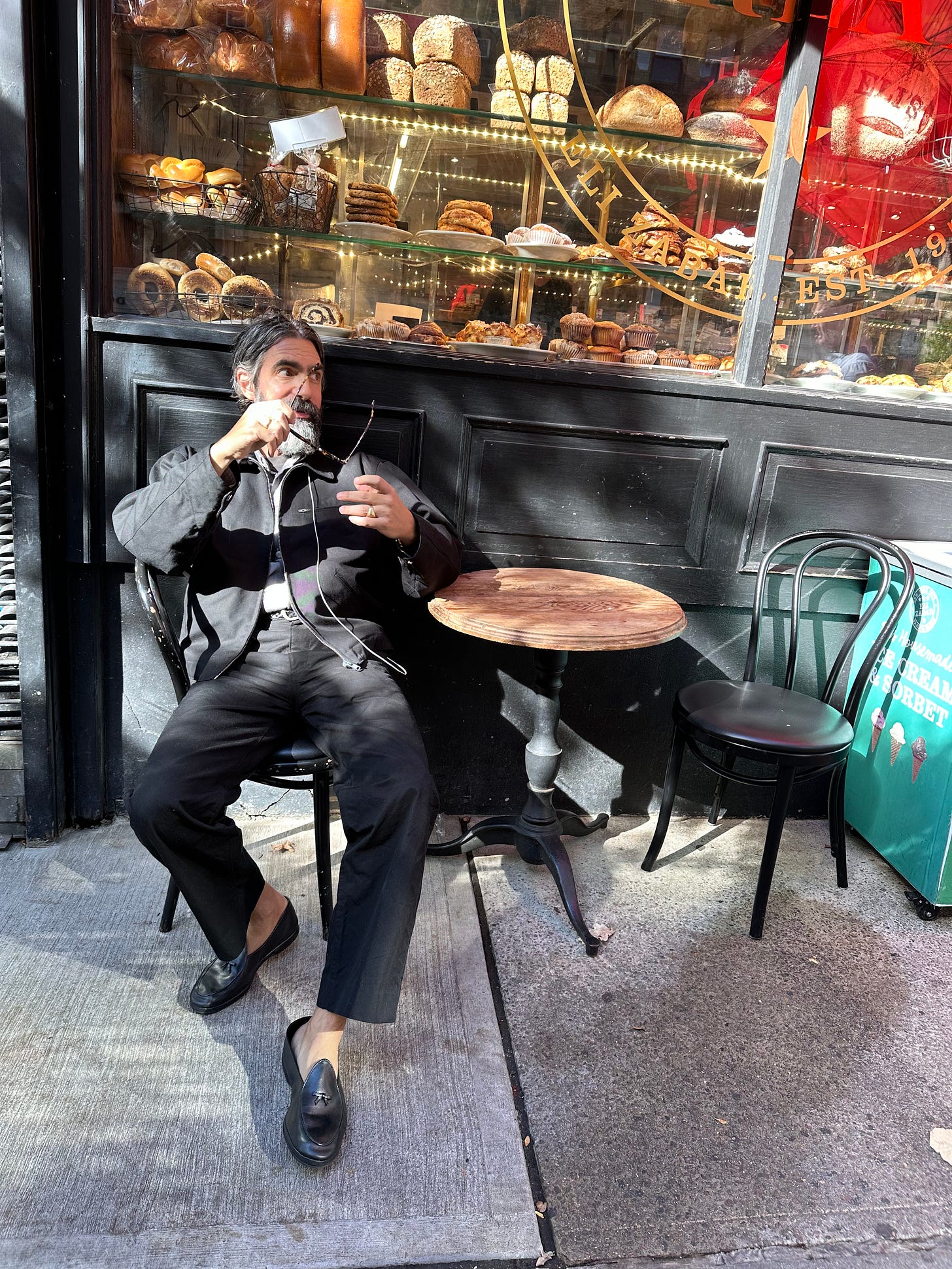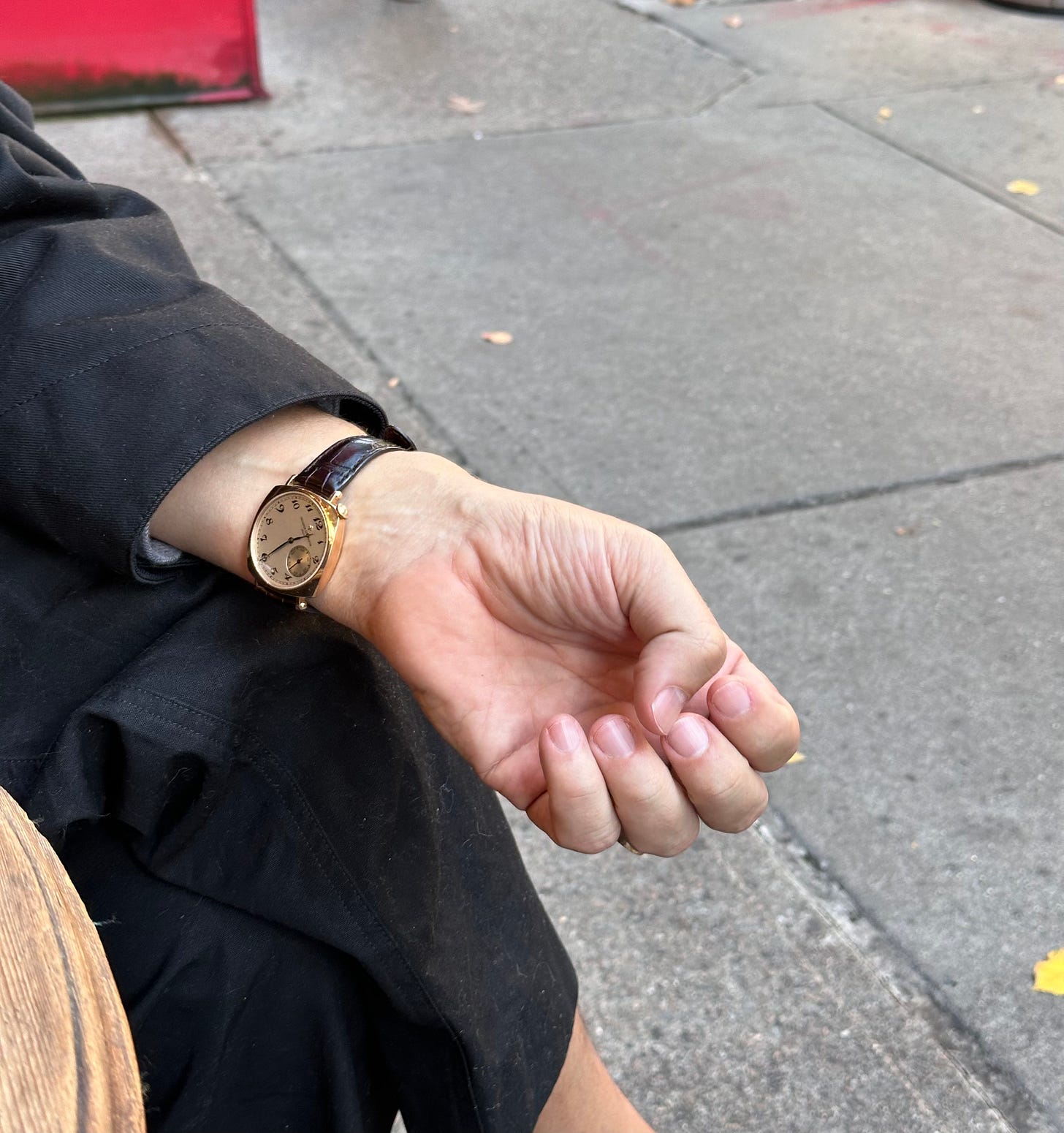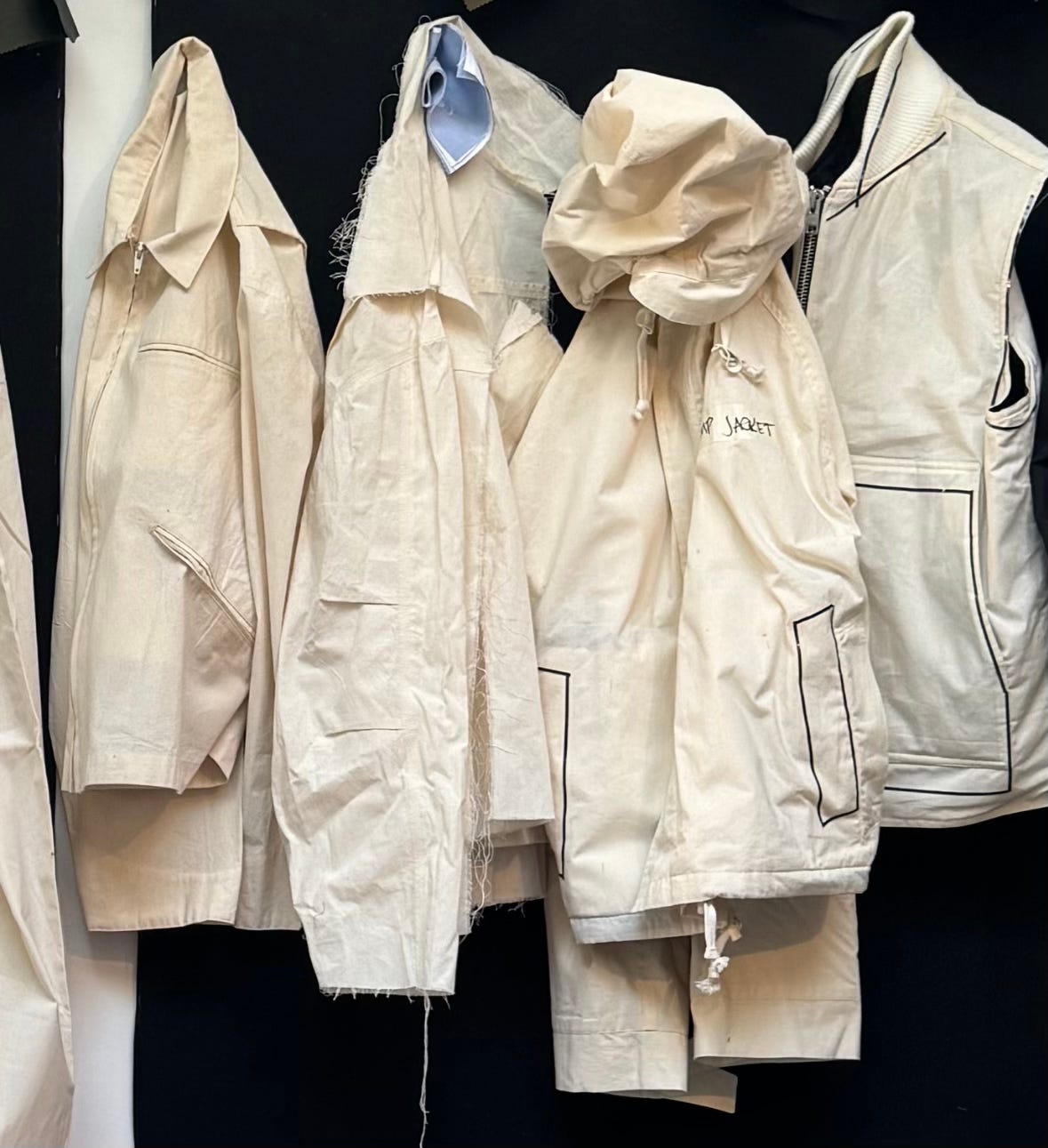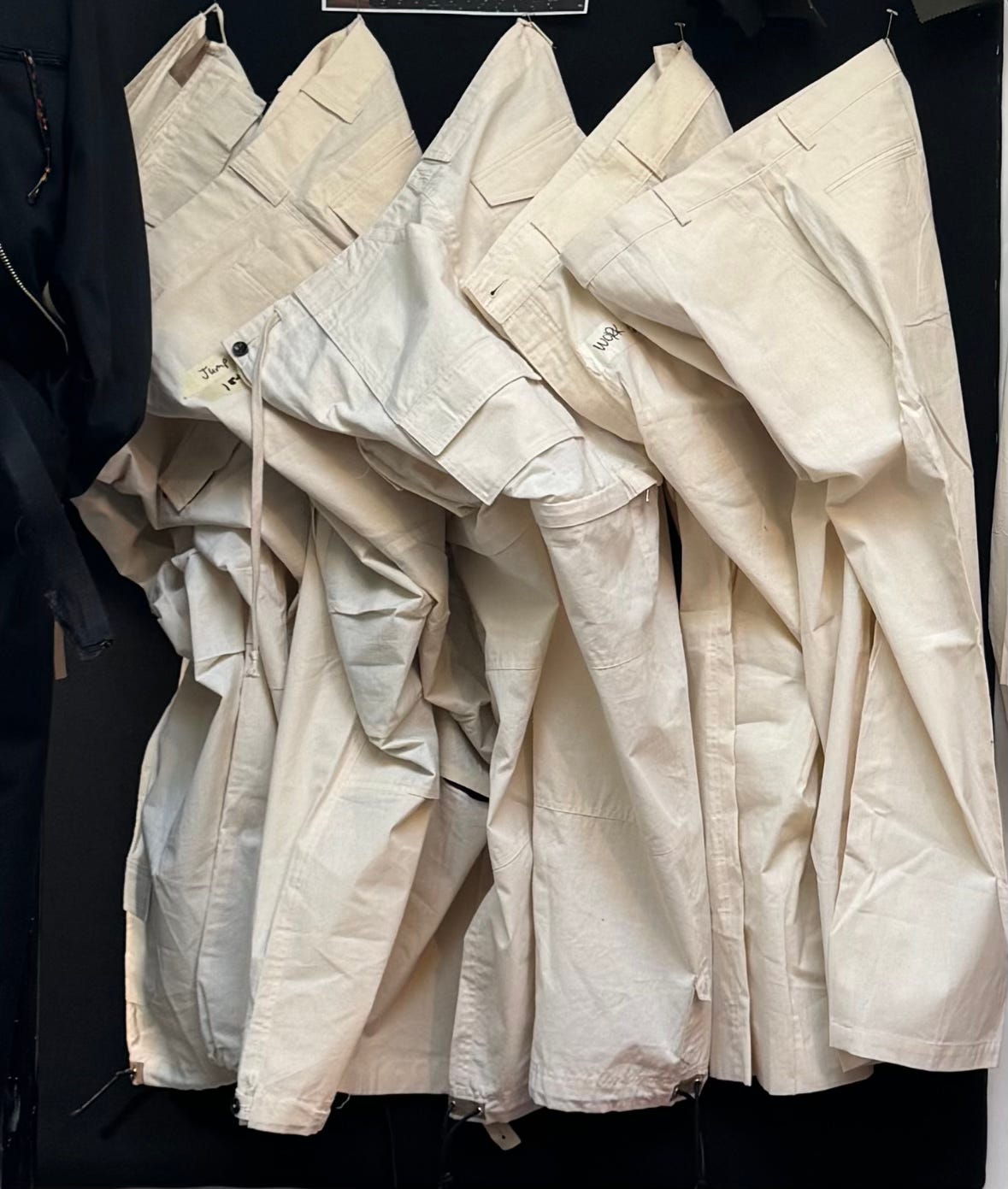How to get dressed with Aaron Levine
"You can either get into the inner tube and ride the river or fight upstream."
Aaron Levine is a menswear designer who lives in Granville, Ohio with his teenage twin daughters and wife. He just launched his first label, Aaron Levine New York and on the occasion, we spoke about his career trajectory, family life, a freaky-deaky recurring dream that found him nose to door with an attic he refused to enter, and the simultaneously comforting and electric feeling of aliveness you get when you show someone your weird and they show theirs back.
Read the interview, enjoy the style advice (“don’t flip more than one switch”) and take solace in the open heart with which he lives.
To read the last edition of How to Get Dressed with Brie Welch, click here.
Look 1: What to wear on…
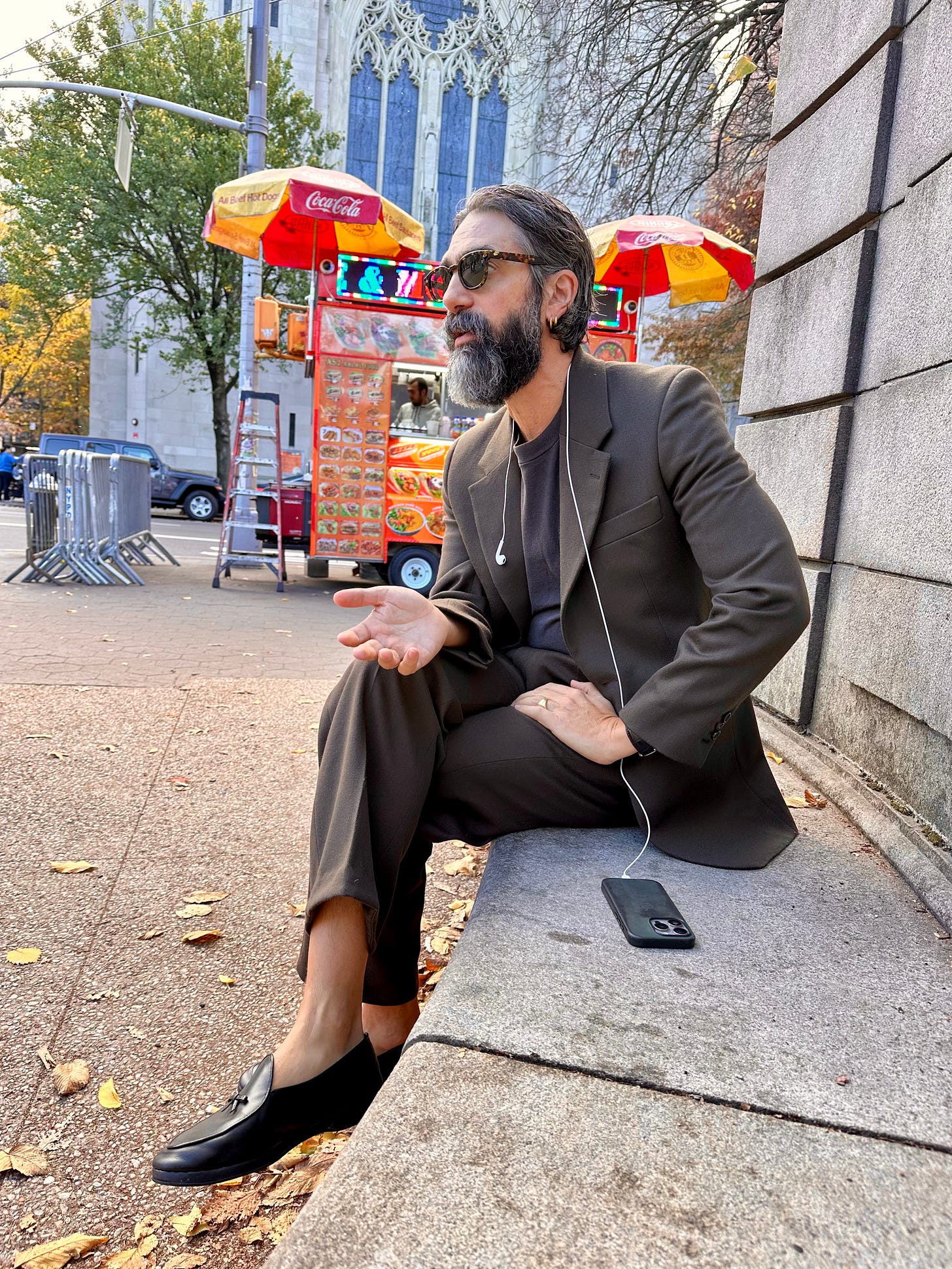
I don’t dress for occasion. I wear this to work, to go out, if I have an event — it’s a multi-hyphenate. I’m kind of grungy so I need to do something that makes me feel a little less so.
There’s no real process to [how I get dressed], I go with how I’m feeling in the morning. I can’t play music, I don’t paint, I can’t sculpt, style is it for me. It’s my creative outlet. I’ve been like this since I was 4-years-old. I used to lay clothes out [on my bed] and combine different textures and elements. It gave me the same sense as what I can imagine it’s like to write a poem or a song.
On the flip side, I do struggle with the superficiality of fashion, but then I look around and am like, Everyone is wearing clothes, all of us need to get dressed and some people use them the same way I do, some are purely utilitarian, some don’t care at all and all of it is okay.
I know starting a brand is risky but in an interview recently, someone asked, “What makes you think you can contribute or add something else to fashion?” and I was like, would you ask that to someone who was making an album? Would you say, “No more music?” [Creative people] just try to make sense of the world through their craft. [At Aaron Levine,] we’re just trying to make beautiful things, for men and for women.
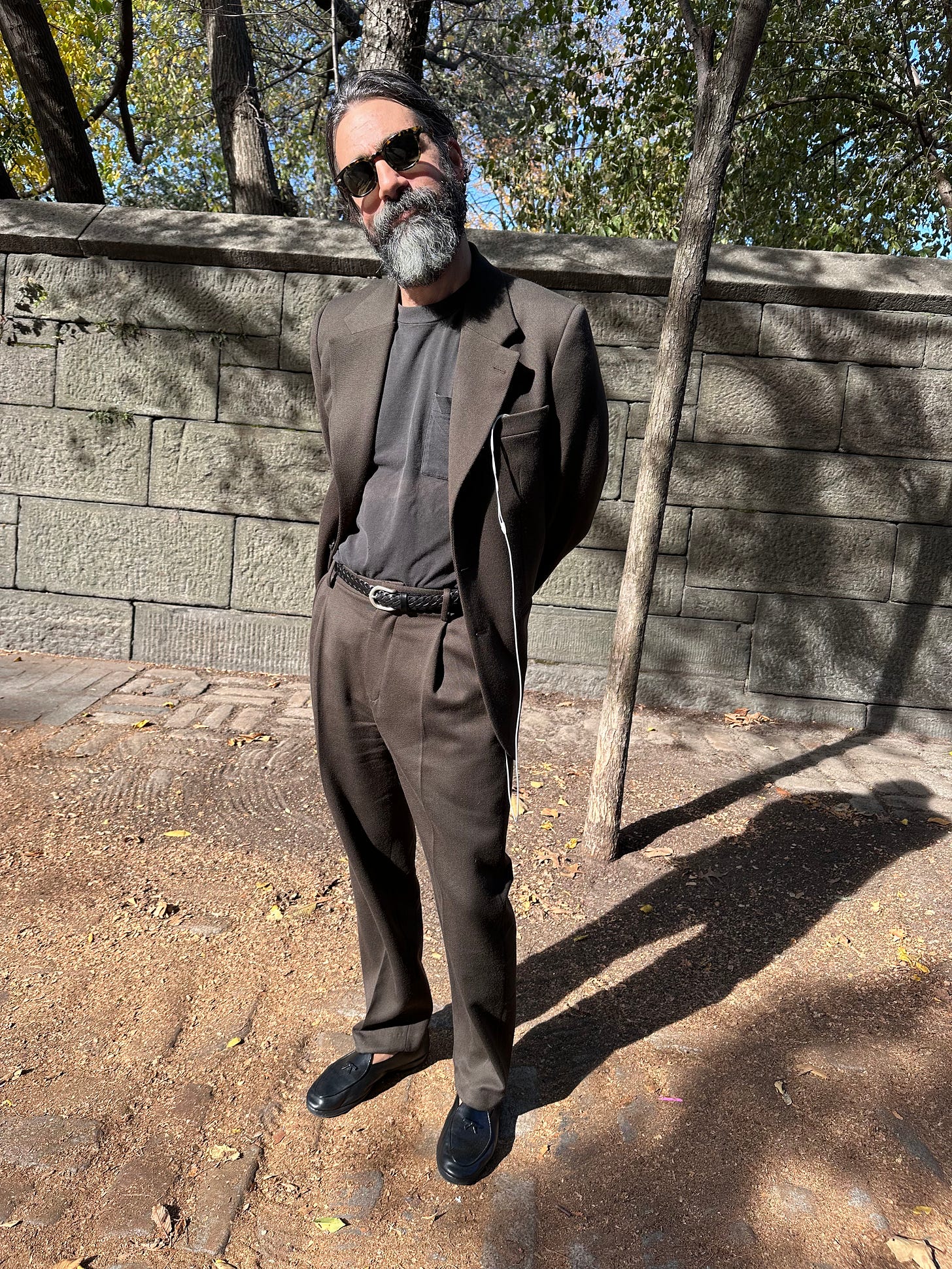
[It took a long time for me to get to be okay with that,] but instead of being super self-conscious and insecure, [I reasoned] that the chances — for anyone — are that if you like something and are super passionate about it, other people might respond to it, it might fire up a passion for them too. I just think there’s a key for every door.
And the truth for any [form of] creative expression is that they’re a version of the person’s story. These clothes that I’m making are a version of my story. They allow me to use my brain, which is a mess, to discharge some of the chaos and release it in what I hope is a resonant way.
I find that the more you hit your tuning fork, the more you see what’s in tune in your life and where you’re like, not even at the same concert. Somehow this helps me let the dumb shit go.
Look 2: What to wear when…
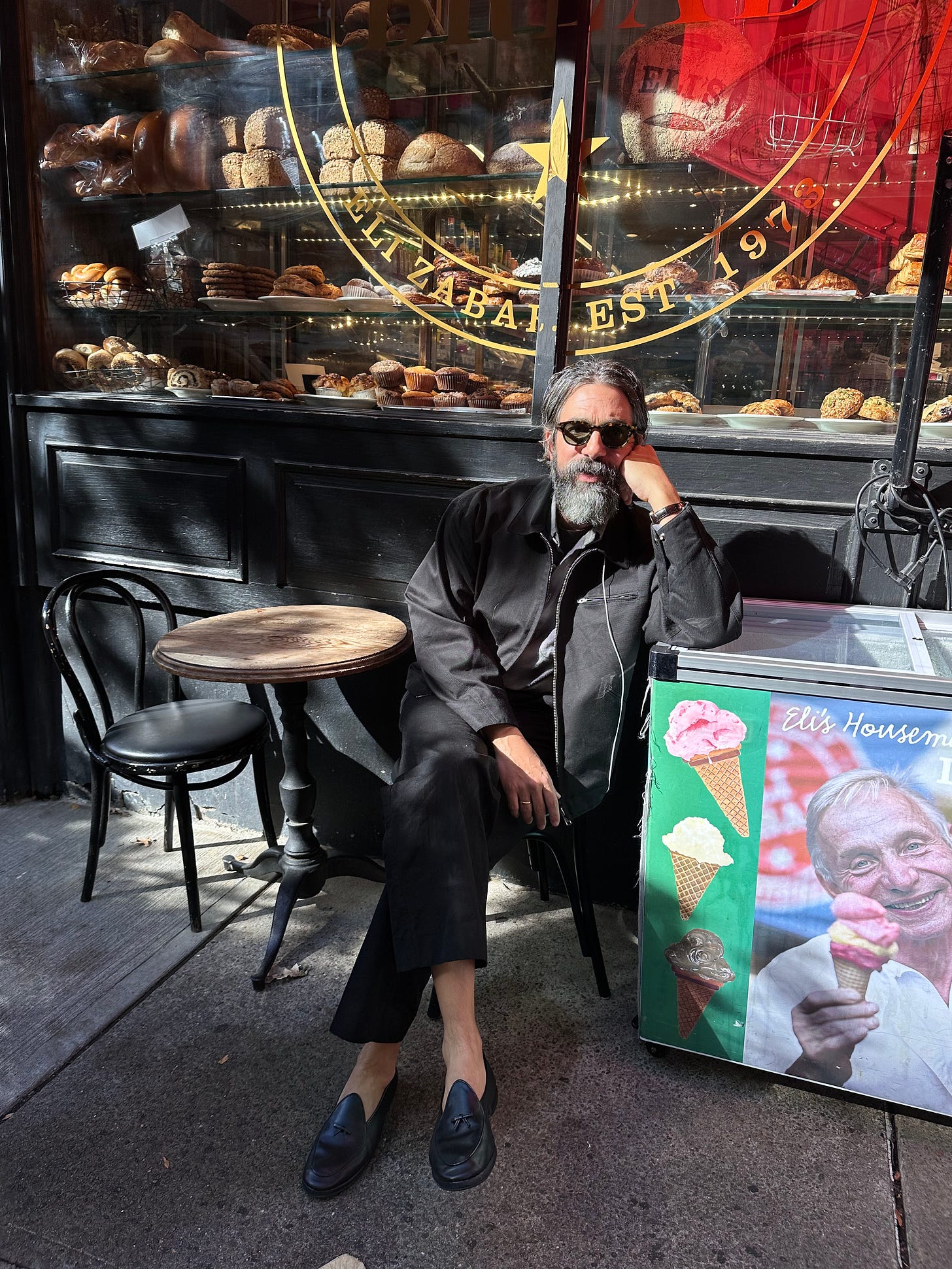
Again, everything I wear, I would wear anywhere. I’m just looking to feel like myself. I wore this look to a black tie gala. I reasoned that I’d rather be dressed differently from everyone else but feel like I’m in my own skin than the opposite, dressed the same but crawling out of myself.
That’s the important thing about clothing, it really can help you do you. In this outfit, I just feel relaxed, comfortable, put together and that allows me to come across in a way that is genuine.
Career trajectory
My career path has been interesting. I’m originally from Virginia, but moved to New York over 20 years ago. My first job was at Joseph Abboud as a wholesale sales assistant. It was a bottom of the barrel role that I got from applying to the job online.
I had no connection to the industry and it’s where I met my wife. I stayed at Abboud for two years before moving over to Hickey Freeman where I worked for five years. This is really where I started to learn about men’s tailoring. It was a super immersive job.
After that I went to a small brand called Rogues Gallery. I was there for about a year. I found out they couldn’t afford to keep me on staff by reading it in the paper, meanwhile my wife and now twin daughters are home and I’m the sole earner.
We went to Virginia, to my parents place, to regroup for a week after I was let go, but the bright side of the lay off announcement was that someone from Jack Spade had read the announcement and reached out asking me to interview.
While I was in Virginia, I build this like, diorama of a store to present to Jack Spade in the interview. I literally built a store on a table. Then I drove from Virginia to New York with my little store, wheeled it into the Spade office on a dolly and then built it up in their conference room. I knew I needed to make an impact and I did. I got the job.
I remember driving through the Lincoln Tunnel to go back to Virginia when the Talking Heads came and I just started crying. I was so excited that I got to call my wife and tell her we’re back in it. We got the job. Those boxes were more than a store, they were my will to fight.
There are times when ideas pass through your mind and you’re like, I can either run with it or I can be “normal.” When you choose to be as true to the weirdo you are on the inside, I believe you get what you need.
Sometimes you’re ostracized, don’t get me wrong, but if you tap into whatever stream is flowing over your head, it’s like a secret road to finding your bliss. But it’s difficult to feel safe doing that because it’s such a vulnerable expression.
Anyway, after a year at Spade, I got a call from Club Monaco for a VP role. I was interviewed there for 6 months and was so far out of my depth with the role — my ego was like, you are getting hired for your ideas and vision but the truth is, when you’re owned by such a big company (Club was owned by Ralph Lauren at the time), there is so much more [than your creative impulses] at stake. It was a massive learning curve that led to my first nervous breakdown.
About two years after I started, a different pressure was applied to me than I had experienced before. The CEO at the time had me on the ropes, which really impacted my self-confidence. I didn’t know which end was up. I started designing [through the lens of] What would other people like from me? instead of the This is what I believe in.
Once I started trying to anticipate what other people would want, I lost my point of view.
I wasn’t sleeping, exercising or eating properly and I was scared to lose my job, which made me scared to create.
One morning in February, I remember waking up and thinking to myself, “What am I doing? If I don’t believe in what I make, how can I stand behind it?”
I reforged my resolve and vowed to push forward with a renewed vision. Some of it worked, some of it did not, but at least I could defend it to myself and know I was doing the best, pushing myself to the honest limits of my creativity.
Shortly after, I went to Abercrombie.
Abercrombie had intrigued me for a while. Here was this huge global vertical retail brand that had lost its way, kind of like I had at Club. My buddy ended up going there and I called him and said, “Hey, you need help.” His response was “When can you start?” And that was it.
I was brought on as VP of men’s design (a year later, I was promoted to SVP of mens and women’s), which is what took me to Granville, Ohio where I live now with my teenage daughters and wife. We live on a farm.
I was at Abercrombie for six and a half years. By the time that job ended, my kids were in high school, so we were staying.
I got fired from Abercrombie in 2021 and really went off the rails and struggled there. I poured myself into that job and whatever you pour yourself into, you become attached to, or I really have to personalize this: I was hurt.
Getting fired shook me and my confidence. It was Covid, so we weren’t in the office, and I was outside of our house on a video call and that’s when they told me the news. I went back inside and my kids and wife were there and I said, “I don’t have a job anymore.” It felt like being on one of those drop tower things in an amusement park. I tried to tell them confidently and handle myself with grace but on the inside, I was a puddle.
I posted about it to Instagram, which I think I did to cope, but you know, when you’re at the bottom of the wheel, you might get a hand from someone and when you do, you’re just so fucking grateful for it.
When you are your weirdest, truest self with people and they respond to it and show you their weird true selves, they become your people. You’re bound in a different way.
The friends who helped me over the bridge between my last job and this launch — I will never forget those acts of generosity.
After I posted about losing my job, my friend Teddy (the owner of Aime Leon Dore) messaged me to do some stuff with him at ALD. And then Caroline Belhumeur gave me a chance to help out with Vince. These gigs really got me through.
Launching a new brand
The idea of doing something myself, given how my brain works, always felt so complex. I could not figure out how to make it make sense. But about a year ago, Michael Williams (writer of A Continuous Lean) introduced me to this guy, Josh York, who opened a cut and sew factory in Detroit. He came down to Granville and showed me some of his work and I was really taken by the quality. The bones and the build of [the tees and fleeces] were there, so I started doing some stuff with him — we did a project for Huckberry, then started making our own stuff. But I realized it wasn’t the whole story, I wanted a woven component — outerwear, trousers, tailored shirts.
There was this guy, Arturo, with a small atelier in Williamsburg, he makes beautiful things. I’d met him about a year before at an event and took his number. I cold FaceTimed him on a Tuesday morning and asked if he’d ever want to make stuff. He said, “Let’s go,” so I sent him a box of some ideas I had in mind and in ten days, he’d hand cut everything.
It’s art work.
[His work] is sculpture.
He takes these ideas and bring them to crazy life.
I put on one of the pieces and broke down. I thought to myself, Okay, we have muslins now.
This is about a year ago, and at the same time, a close friend of mine had lost her job. She sourced raw materials for another brand and started helping out too. All of it just clunked into place. That’s how you know it’s the right time and the right thing and look, there is always a reason not to do something but it’s important to pay attention when life rafts are thrown your way, you know?
On cultivating style
It takes time. I dressed like a clown at the beginning. When I was at Hickey Freeman, my boss who became a mentor told me I looked like a clown. He was like, “You get to flip one lever, right now you’re flipping all of them.”
Less is more — I’m vomiting words all over you right now but I really do believe that when you say less, when you wear less, it’s more impactful.
But then, you know, when you flip no levers, it’s so flat. You’re not saying anything! So you’ve got to find the balance.
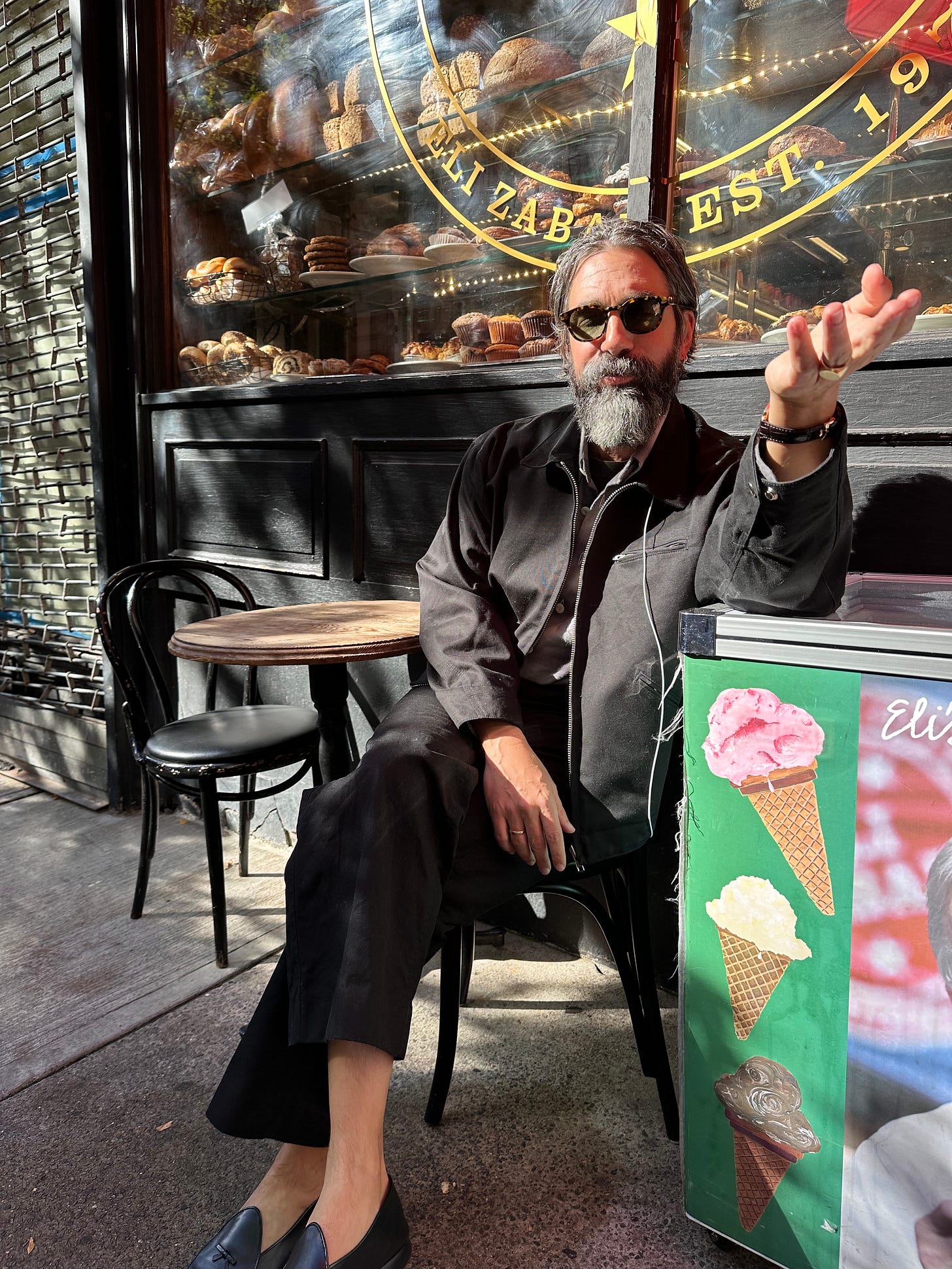
I grew up in a clean plate club, meaning, you get a plate of food and you eat all of it; you wear something and then immediately throw it into the wash. I don’t do that anymore. I want to get a bunch of use out of my stuff. The more you wear and use the things you invest in, the more they form themselves to your body and the more they become yours.
I like to buy nice things. I like that! But then I like to beat the shit out of them, to really use them. Who cares if it gets a hole?
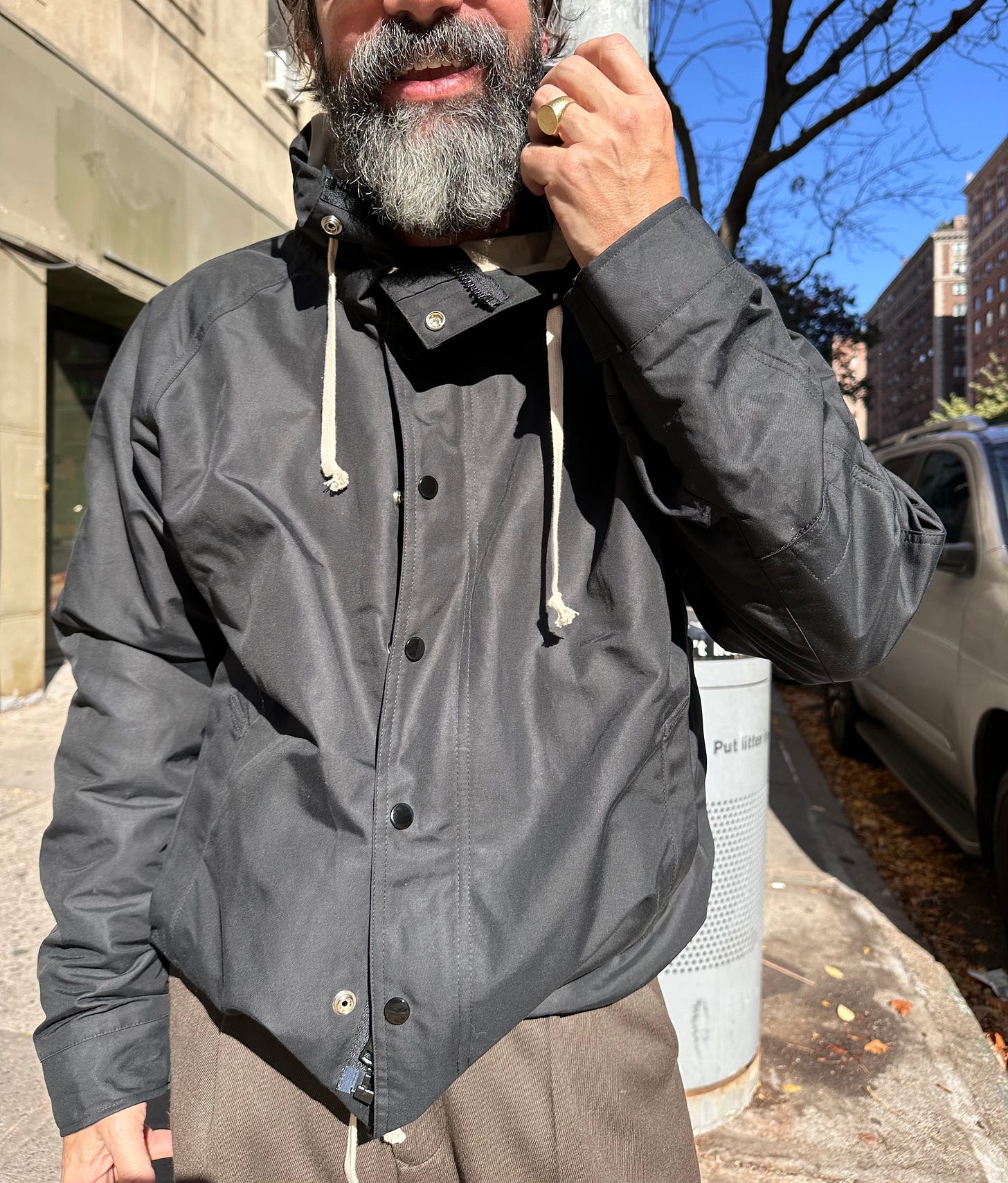
I didn’t inscribe my signet ring but I wear it everyday and every ding and every nick — that’s my signet. They become the impressions of everything I have done, thought — of who I am.
Look 3: What to wear if…
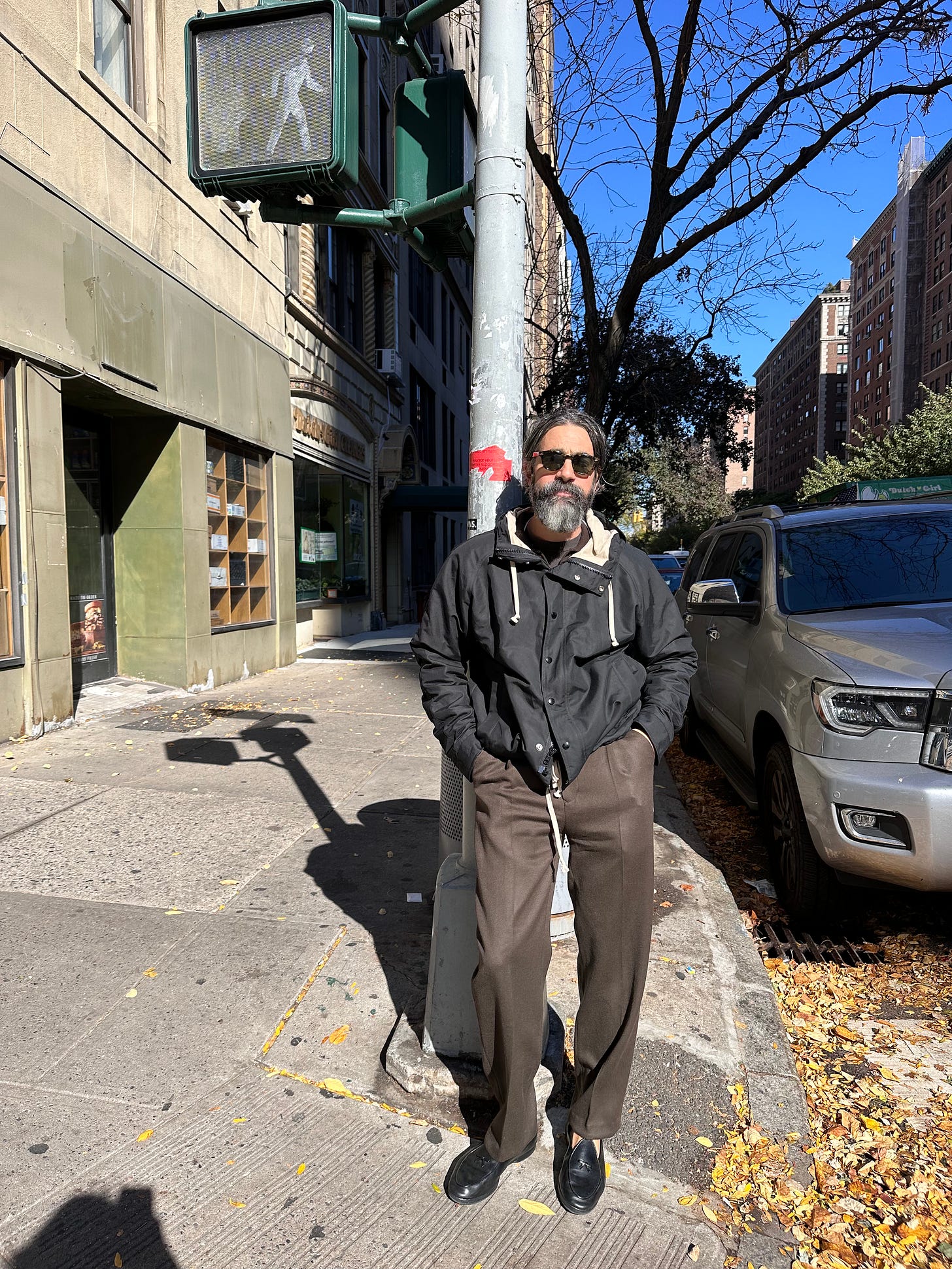
I’m wearing the same t-shirt and trousers that I wore in the first look. I mean it when I say, “Wear all the things you have.” The sunglasses are Moscot. This is the only frame I wear. The headphones hanging over the look are an intentional style choice. They are there to break up the dark colors.
On companionship: “Can we enjoy each other’s company sitting in the backyard playing Uno?”
Is my wife into fashion and style? She is more of a form-over-function kind of woman. She doesn’t really care. She’ll wear leggings and a sweatshirt, or jeans and a t-shirt and be perfectly fine. Sometimes I’ll make a suggestion when she is in like, a hoodie or something, and she’ll say, “I’m not your doll.”
It bothers me, but it doesn’t bother me because this is who she is. In the whole scheme of things, I could not actually care less.
We met 4 months after I moved to New York — we were both at Joseph Abboud. I remember telling her, “There’s a happy hour, do you want to go?” and she said, “Who’s going to be there,” and I was like, “So far, me, and maybe you?”
It was comfortable with us right away. She’s an honest, good person and an incredible mother.
I subscribe to the theory of lowest common denominator as far as court- and companionship. Can we enjoy each other’s company sitting in the backyard playing Uno? Can we do simple mundane things and have it be fun?
There are things that matter to men that we try to mask — our deep, genuine feelings.
This is all 101 stuff and I’m drawing from personal experience and really don’t want to generalize or project on anyone else what I feel, but fear, loss, regret, passion — we try to turn the volume down on those things and it’s so important, I think, to be able to feel safe with a partner so it can be expressed.
My daughters are 16 years old. They’re twins. I love being a girl dad. I didn’t know what that meant or what we were having before they were born and maybe it’s just them that makes me love being a girl dad, but it’s great. Who they are is awesome. They’re outgoing and confident, strong kids. They’re amazing in school which isn’t a qualifier for things but I sucked at school so to watch them not have to struggle in that way brings me great joy.
They dance five days a week so they have this structure that’s not coming from us and they have a great friend group. They’re just not riddled with the same demons I have wrestled with, and they’re gracious and friendly.
Have they softened me? Honestly, I’m pretty soft, but you know I’ve been raising them since birth and [having girls] gives you [as a dad] a whole different perspective. It’s like, I never worry about walking down the street alone or at night, but when I imagine them walking on the same street…there is just something about a woman’s intrinsic awareness of her surroundings that I think is easy to take for granted for a lot of men.
Closing advice
Keep reading with a 7-day free trial
Subscribe to The Cereal Aisle by Leandra Medine Cohen to keep reading this post and get 7 days of free access to the full post archives.


